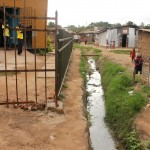In the first of a series of blogs about our research on urban poverty in Uganda, Sophie King talks about the project’s inclusive research process and methodology:
In January 2016, a group of us came together to begin a process of co-producing knowledge on how governments can better support the improvement of living standards in Uganda’s informal settlements. Specifically, we are looking at the ways in which national and local government, usually in partnership with transnational actors, have gone about the delivery of water and sanitation projects in two divisions of Kampala and in two secondary towns. In the secondary towns, we are considering the outcomes achieved through the Transforming Settlements of the Urban Poor in Uganda (TSUPU) programme.
In an attempt to combine expertise in research methodology, urban planning, and social movement practice, our research partnership brings together a Western female academic, a Ugandan male academic, a team of NGO professionals from ACTogether Uganda, and leaders from the National Slum Dwellers Federation of Uganda (NSDFU). Building on existing ESID research in India, our overarching research question has been:‘What shapes state vision, commitment, and capacity to reduce urban poverty in Ugandan towns and cities?’
Through a co-productive process, we hope to produce a richer understanding of ESID’s core research questions than a more extractive research strategy might have generated. In a sometimes
clumsy, necessarily adaptive, and occasionally systematic way, we are trying to move forward in a research team that reflects the composition of our overall partnership. Mistakes … we’ve
made a few. But we’re also excited and energised at the power of research to be transformative when it works this way. It is not easy, and with so many constraints on getting these kinds of projects financed and off the ground, we are lucky to have this opportunity.
That’s why we wanted to share some of our reflections on the complex challenges we have encountered along the way: How do we balance the views and identities of experts, politicians and citizens, while generating knowledge that is practically useful for members of our partnership? How can we guarantee anonymity and confidentiality, while also making research subjects active investigators? How do we translate local experience into scholarly knowledge? And whose knowledge counts?
Making an omelette without breaking too many eggs
Our research aims to illuminate the ways in which state vision, commitment and capacity shape the character of urban poverty programming and, in turn, to throw light on what shapes the character of state vision, capacity and commitment. It therefore necessitates exploration of highly sensitive and often newly emergent relationships between local governments, communities and, in particular, young regional branches of the NSDFU. It has also followed hot on the heels of a presidential, parliamentary and often closely contested local government electoral period.
The relationships we are touching on are fragile and some of the information generated could be interpreted in many different ways – by some as evidence of failures – even of misused resources; by others as critical learning experiences on a pathway to partnership and transformation. Participants in the research reflected that it was sometimes difficult for people to speak out: “technical people would speak, but they fear the politicians knowing what they’ve said; some federation members might fear what other federation members have said”.
So how have we negotiated this complex terrain? In each sample area an advance party convened a meeting of stakeholders for a detailed discussion about the research. We held day-long consultations with different leaders within the regional federations. These aimed to break down what at first glance seem like abstract ‘academic’ concepts, but which after in-depth discussion and participation in the data generation process become issues that federation members (and officials) are engaging with on a daily basis: inclusion; state capacity; political commitment; the transformation of ideas, attitudes, and visions for urban development and informal settlements. We have worked through federation members themselves to initiate relationships with local politicians and technical officials to simultaneously legitimise the role of slum-dwellers in the programmes under study, while demonstrating commitment to involving government in producing the knowledge we seek to create…
For the full article: click here